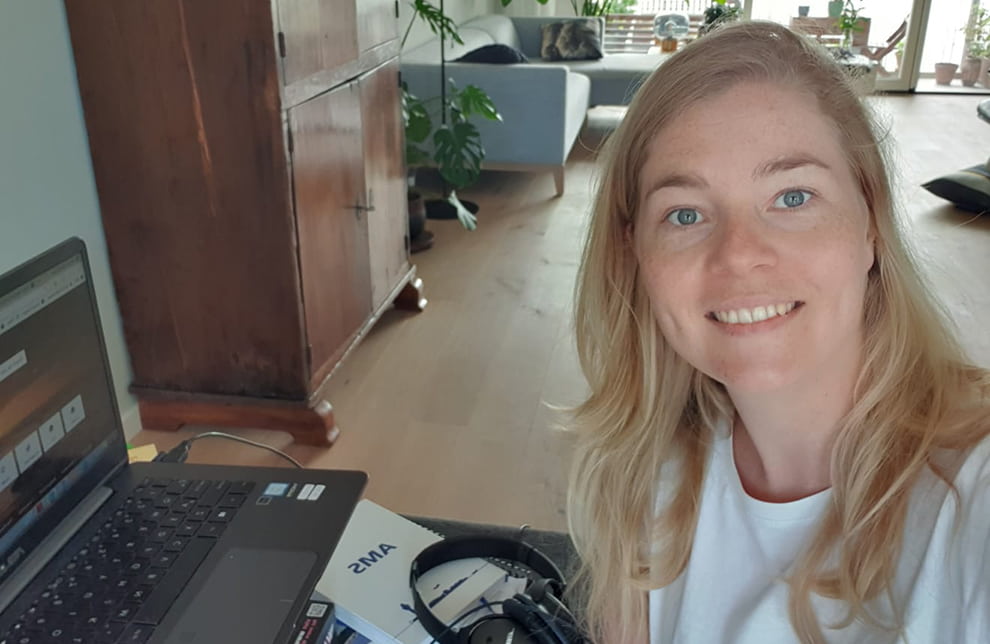The airline industry is facing unprecedented challenges. Passenger numbers have never been lower, and many airlines need to make tough decisions in order to stay afloat. But Sophie Mosch, Route and Business Development (RBD), reminds airlines that the priorities before the pandemic will remain priorities after it. And that means exploring ways to make air travel more sustainable. Just like the Road to Recovery, we’re all in it together when it comes to reducing noise and emissions.

Published on: 24 July 2020
Born for RBD
Sophie first discovered Schiphol when she was still studying Business Studies and International Management at university. ‘Schiphol is at the intersection of the public and private sector, in a dynamic and international environment, so it was the ultimate place to do a traineeship,’ she says. ‘I started working in HR/Passenger Services, Security and Aviation Marketing. And that’s when I knew I wanted to be part of the RBD team. The team is so incredibly friendly and committed, and is a lot of fun to be a part of. The close contact with so many different partners, and the ability to travel and connect with airlines also really appealed to me.’
Since then, Sophie has taken on various roles at Schiphol. Among them, she spent a few years in the Asset Management department as Team Leader and Change Manager. ‘But as soon as a position became available in RBD three years ago, I jumped at it,’ she laughs.
The local perspective
Sophie is responsible for all of the Dutch home-based carriers: TUIfly, Corendon, EasyJet and Transavia. She also shares responsibility with the RBD team for KLM. ‘It feels good to put my expertise to work for our home-based airlines,’ she says. ‘We’re able to connect on a variety of levels, and talk about strategy, network development and progress on a much broader level.’
Sophie also advocates for the airlines in discussions about innovation, passenger experience, sustainability and more. ‘When we run a pilot of a new system or service, we often work with our home-based airlines, and we strive always to enable the airlines, and facilitate new opportunities and future growth.’
As the home-based airlines also begin to recover in the wake of the coronavirus, Sophie says they share the same concerns as major international airlines. And Schiphol is doing its best to offer them all support and understanding. From airline charges to campaigns to restore traveller confidence, RBD is focusing on helping airlines get back in the air as soon as they can. ‘It’s such a thrill to do the “Welcome Back” moments with the airlines we’ve missed so much. And by 1 July, all of our home-based airlines will be back in business. I couldn’t be happier about that,’ she says.
Back to business
But recovering from the pandemic also includes a refocus on priorities established long before the virus struck. That’s why Schiphol works closely with major airlines on the sustainability goals. ‘Noise reduction was a huge issue for Dutch citizens, and we continue our efforts to reduce noise as flight movements increase,’ Sophie explains.
But home-based carriers are also doing their part to help meet Schiphol’s Vision 2050 objectives when it comes to sustainable travel. ‘Specifically, the “Quality of Life” pillar of the strategy focuses on people and the planet,’ Sophie says. ‘We consult with many other partners in the aviation industry, including our airlines, to work on solutions that not only make the airport, but also the wider aviation sector, more sustainable. Fleet renewal and the use of Sustainable Aviation Fuels are great examples of how to reduce our environmental impact.’
Sophie says that airlines clearly have other priorities at the moment, but that recovering from the pandemic is also an opportunity to look at emissions and noise reduction. ‘The reasons for more sustainable travel haven’t changed because of the crisis,’ she explains. ‘But the virus is giving the aviation industry the chance to really be creative, and put their best minds to work on recovery solutions. Airlines can reflect on the past and rebuild in a new way.’
An autonomous team
Meanwhile, RBD has been doing some reflecting and rebuilding of its own. When the team’s manager left, the team decided to divide the management responsibilities among themselves, and operate as a self-organising team. ‘This gives us the chance to be more efficient and more autonomous, and we rely on each other even more,’ Sophie says.
Sophie uses the skills she developed in Business Studies and Change Management to contribute to the ways that the team is organised, and her focus on sustainability helps the team stay connected to this key Schiphol pillar. And since she knows that development is key to continued growth, she’s also pursuing a study in Biodynamic Agriculture. ‘Sustainability is very important to me, and crucial for our future,’ she says, ‘so the more I learn about different aspects of the issue, the better I can focus my career on the things that matter most to me.’